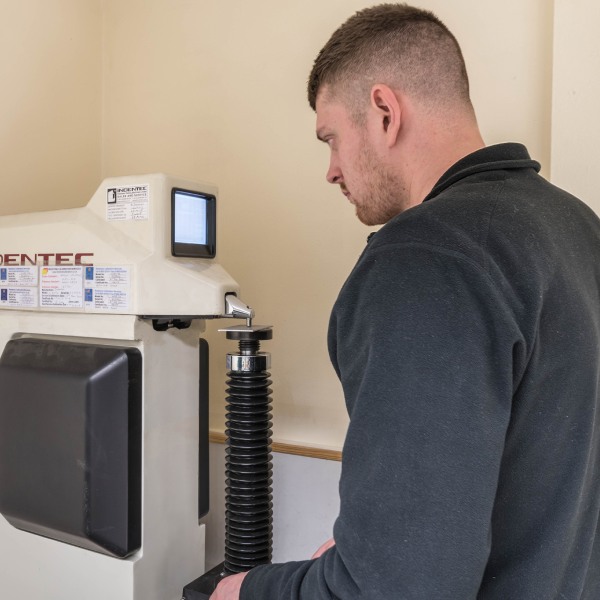Material Testing Evaluation
Alloy Heat Treatment provide a materials evaluation service, using conductivity and hardness testing. This is carried out by Prime Approved, Level 2 qualified operators, using equipment certified to National and International standards. This enables us to verify the conformance in compliance with aerospace industry requirements.
Our Material Testing Evaluation Process
- Evaluating & Testing Metal & Alloy Components
- Conductivity Testing of Metals & Alloys
- Hardness Testing of Metals & Alloys
- Carried Out By Prime Approved Level 2 Qualified Operators
- Certified to Prime Contractor, National Physics Laboratory &
- International Standards
- Material Evaluation Testing for Aerospace, Automotive & Engineering

What Is Material Evaluation Testing?
Material evaluation testing, refers to the process of testing and analyzing the physical and mechanical properties of materials, particularly metals and alloys. The primary objective of material evaluation testing is to assess the quality and suitability of materials for a specific application, and to identify any defects or flaws that may compromise their performance. In metallurgy, material evaluation testing involves the use of methods such as conductivity testing and hardness testing to determine the electrical conductivity and resistance to deformation of materials.
Hardness testing is another critical materials evaluation method used by UK-based metallurgy and heat treatment companies. This type of testing measures the resistance of a material to deformation and provides valuable information about the strength, durability, and wear resistance of the material. There are several methods of hardness testing, including Rockwell, Brinell, and Vickers testing, each involving applying a specific amount of force to the surface of the material and measuring the resulting indentation.
Hardness testing offers several advantages. It can provide a wealth of information about the properties of a material, including its strength, ductility, and wear resistance. Additionally, hardness testing can evaluate the quality of a material after it has been subjected to various treatments, such as heat treatment or surface hardening. This makes it a valuable tool for assessing the effectiveness of different manufacturing processes and ensuring that materials meet specific quality standards.
However, hardness testing also has some disadvantages. It can be a destructive testing method, as it involves creating an indentation in the material being tested. Additionally, the accuracy of hardness testing can be affected by factors such as the surface finish of the material, the temperature of the material, and the size and shape of the indentation created during the test.
What Is Hardness Testing?
What Is Conductivity Testing?
Conductivity testing is a non-destructive method that is used to evaluate the electrical conductivity of materials. It is a useful method for assessing the quality and consistency of metals, alloys, and other conductive materials. The test involves inducing eddy currents into the material surface via a probe, and same probe meaures the electrical inpedance, where the greater the impedance, the lower the conductivity of the material under test.
Conductivity testing offers several advantages. It is quick, easy to perform, and does not damage the material being tested. This makes it ideal for evaluating the quality of large batches of materials or assessing materials that cannot be easily dismantled. Additionally, it is a cost-effective method for determining the quality and composition of materials, as it requires relatively simple equipment.
However, conductivity testing has some disadvantages. For example, it can only evaluate the electrical conductivity of the material and cannot provide information on other properties such as mechanical strength or ductility. Additionally, the accuracy of conductivity testing can be affected by factors such as the temperature of the material, the purity of the material, and the geometry of the sample being tested.
Our Materials Evaluation Testing Process
Dye-Pen Resources
National & International Standards For Materials Evaluation Testing
National and international standards play an important role in regulating materials evaluation testing and ensuring that materials meet specific quality requirements. In the UK, materials evaluation testing is regulated by organizations such as the British Standards Institution and the International Organization for Standardization (ISO). These organizations provide guidelines for conducting tests and evaluating materials and also certify equipment and personnel to ensure that testing is performed to the highest standards.
Material Evaluation Testing For Aerospace, Engineering & Automotive Projects
Materials evaluation testing is crucial for the automotive and engineering sectors in the UK. Materials must meet strict quality standards to ensure safety and reliability. Conductivity and hardness testing are just two examples of the many testing methods used to evaluate materials in these industries. Other common methods include tensile testing, fatigue testing, and impact testing.
Testing: Blogs, News & Resources
We have a list of helpful blogs on the subject of Conductivity Testing, feel free to search our knowledge base and our blogs to familiarise yourself with the processes we undertake during the Testing service.
Blogs:
Post Heat Treatment: Corrosion Testing
Post-Heat Treatment Testing: The Power of Conductivity Testing
Hardness Testing & Conductivity Testing FAQ’s
Hardness testing is crucial in materials evaluation as it provides a means of determining the effectiveness of the heat treatment process, without destructing tested parts. Hardness testing provides information about a material’s resistance to indentation, wear, and deformation. It helps assess the material’s strength, durability, and suitability for specific applications.
Hardness testing assists in quality control by ensuring that materials meet specified hardness requirements. It aids in material selection by identifying suitable materials for specific applications based on their hardness values and desired mechanical properties.
Conductivity testing helps evaluate the electrical conductivity or resistivity of metals and alloys. It is valuable in assessing material purity, identifying potential defects, monitoring heat treatment processes, and verifying the alloy composition.
Conductivity testing determines heat treatment uniformity of individual parts and heat treated natches of parts, and can also identify material defects such as cracks, inclusions, or variations in alloy composition. Changes in electrical conductivity indicate potential material inconsistencies that may affect performance, durability, or electrical applications.
Yes, portable or handheld devices are available for onsite hardness and conductivity testing. These devices provide quick and convenient measurements, making them suitable for field inspections, quality control checks, or material verification at remote locations.
Common hardness testing methods for metals and alloys include Rockwell hardness testing, Brinell hardness testing, Vickers hardness testing, and Knoop hardness testing. Each method offers unique advantages and is suitable for different material types and applications.
Hardness testing provides an indirect measure of a material’s overall strength. Although hardness is not the sole indicator of strength, there is a correlation between hardness and ultimate tensile strength.
Eddy current testing, electrical conductivity measurement, and the use of conductivity metres are common methods employed for conductivity testing of metals and alloys. These methods offer non-destructive and rapid evaluation of electrical conductivity.
Yes, hardness and conductivity testing can be performed on the same sample. The sample can undergo hardness testing using appropriate methods, and then conductivity testing can be carried out using the suitable electrical measurement techniques.
A metallurgy or heat treatment company specialising in materials evaluation can provide hardness and conductivity testing services using calibrated equipment and established testing protocols. They can offer expert analysis, interpretation of results, and recommendations based on the specific material requirements and industry standards.







